|
FAQs on the Powder Blue Tang Trauma
FAQs on Powder Blue Tang Disease:
PBT Disease 1,
PBT Disease 2,
FAQs on Powder Blue Tang Disease by Category:
Diagnosis, Environmental,
Nutritional,
Social, Pathogen
(plus see
Tangs/Rabbitfishes &
Crypt),
Genetic, Treatments
Related Articles: Powder Blue Tangs, Acanthurus Tangs,
Related FAQs:
Powder Blue Tangs 1, Powder Blue Tangs 2, Powder Blue Tang Identification, PBT Behavior, PBT
Compatibility, PBT Selection,
PBT Systems, PBT Feeding, PBT
Reproduction, Acanthurus Tangs
1, Acanthurus Tangs 2,
Acanthurus Tangs 3, Acanthurus ID, Acanthurus Behavior, Acanthurus Compatibility, Acanthurus Selection, Acanthurus Systems, Acanthurus Feeding, Acanthurus Disease, Acanthurus Reproduction,
|
Soft-bodied... can see finger marks from human handling
on many new specimens. Graceful, but do swim into hard objects.
|
Surgeonfishes: Tangs for Marine
Aquariums
Diversity, Selection & Care
New eBook on Amazon: Available here
New Print Book on Create Space: Available
here
by Robert (Bob) Fenner |
 |
PBT with growth/injury 2/22/13
Dear Bob all other crew members,
<Alex>
I have a problem with a Powder Blue Tang (A. leucosternon). When the
fish arrived it had what appeared to be a scratch along part of its
lateral line (see image #1). I did not pay it much thought since such
minor injuries heal pretty quick in most fish. That was on the 8th.
A few days after that the wound got larger and looked "fleshy" with
whitish protrusions. I thought that this might have been due to an
overeager cleaning shrimp and that it would heal.
But the injury/growth/parasite infection keeps getting worse with the
current state shown in images #2 and #3. I hope you can see that it has
spread enormously along the lateral line, even up to the posterior end
of the scalpel. My phone's camera isn't that good and the fish kept
swimming away… But in person the look of the growth is fleshy and
pinkish (not "fuzzy" as it might seem on the pictures) with small
longish white protrusions among it. Could this be a simple
reaction/inflammation due to the sensitivity of the lateral line organ
or is this something parasitic? No other fish shows any symptoms (yet).
The PBT does not show any discomfort at all, I strangely haven't seen it
flashing even once, and it is very active and curious (i.e. normal
Acanthurid behavior). It is housed in a 400g reef tank with zero
measurable phosphates/nitrogen compounds, 34-35ppt salinity, 78°F
temperature, Ca, Mg, alkalinity, pH all in the optimal range, so I think
environmental conditions are not the main culprit.
<Mmm, no. A physical injury is>
Do you have an idea what this might be and what can be done/if it will
heal itself?
<Am hopeful re the last... only time going by will reveal>
Thanks in advance!
Cheers, Alex
<And you, Bob Fenner>
|
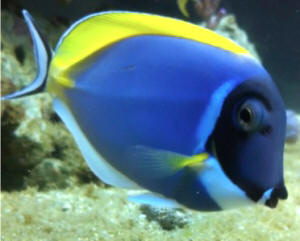
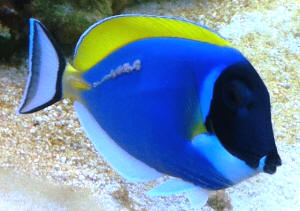
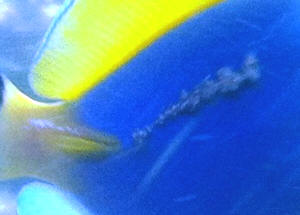 |
Re: PBT with growth/injury
2/22/13
Thank you for your reply, Bob!
Then I'll wait and see. (Definitely preferable to trying to catch the tang…)
Alex
<Ah yes... best not to try and do anything here. BobF> |
|
Fish Disease... A. leucosternon 12/14/08 Dear
Crew, After researching carefully, I am unable to identify the
presenting condition of this Powder Blue Tang. The symptom onset
was eight weeks ago and very sudden. The fish has been in an
aquarium for three years. The fish is quarantined and remains
bright, alert, active and feeding. <Good> I've attached
some hi-res photos to offer you a closer look. <I see
these> If you have an interest or experience to share in this
matter, I'd be grateful. Regards, Greg Danos Owner / Operator
Urban Aquarium, Inc. Anaheim, CA 92806 www.urbanaquarium.com
<Mmm, well... considering that the fish presents as damaged
only on the one side, the length of time in captivity, its
apparent good health otherwise... I would guess (with some
confidence) that this is an issue that started with some sort of
physical injury... that has developed as a secondary, likely
bacterial issue... How to proceed? On a few fronts. I would move
this fish back to a main display that has rock et al. to pick on
at its leisure, and try bolstering what it does eat with vitamins
and HUFA supplementation (e.g. Selcon), and use a cleaner (my
choice, a Lysmata species shrimp) to keep the wound clean, AND
avail yourself of the benefits of "mud" filtration in
the system, have palatable macro-algae present (perhaps a
Gracilaria sp.)... and if available, lace the foods with the
antibiotic Chloramphenicol (Chloromycetin) should your
veterinarian be willing to prescribe this to you for this use. I
have seen similar wounds "heal" with time (months)
going by. Bob Fenner>
|
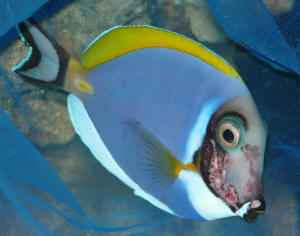 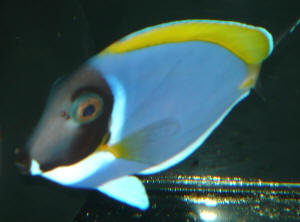 |
|
Re: Fish Disease... A. leucosternon
12/14/08 Bob, <Hook 'em Danos!> Thank you
kindly. I will implement your recommendations pronto. Your Fan
and "Student" for 10 years, Sincerely, Greg Danos
<Ahh! Glad to assist your efforts. BobF>
|
| Powder Blue Tang Disease Id 2/24/08 Hello.
Was hoping someone could help me identify what is wrong with the
Powder Blue Tang I recently acquired. I got him, put him in
quarantine (37 gal. tank, wanted it big enough for when I get big
fish), and thought it was just some scrapes on his side but a
friend that was over said it was body rot. <...?> He is
eating well (algae and omnivore flakes, seaweed sheets, mix of
frozen enriched brine/Mysis soaked with extra vitamins) and is not
trying to scrape on anything (there is some pieces of live rock in
the tank from my 2 yr established tank that has a couple strands of
live feather algae for him on it). He is picking at the algae and
the rock like normal. Please take a look at the pic attached and
let me know what it is and what is the best way to treat if
anything needs to be done. It was suggested I try garlic, would
that be good to add as well? Any help is appreciated! Thanks!
Nicole <These markings are due to injury (handling... fingers
really) during capture, transport et al. stress... Please read
here: http://wetwebmedia.com/powdbluetg.htm and the linked files
above. Bob Fenner> |
|

|
Surgeonfishes: Tangs for Marine
Aquariums
Diversity, Selection & Care
New eBook on Amazon: Available here
New Print Book on Create Space: Available
here
by Robert (Bob) Fenner |
 |
|
|

